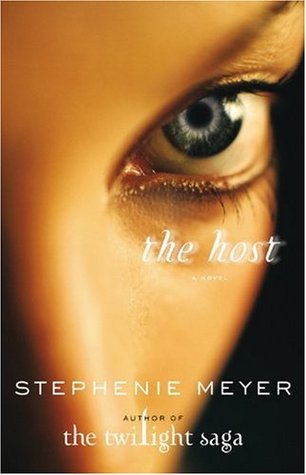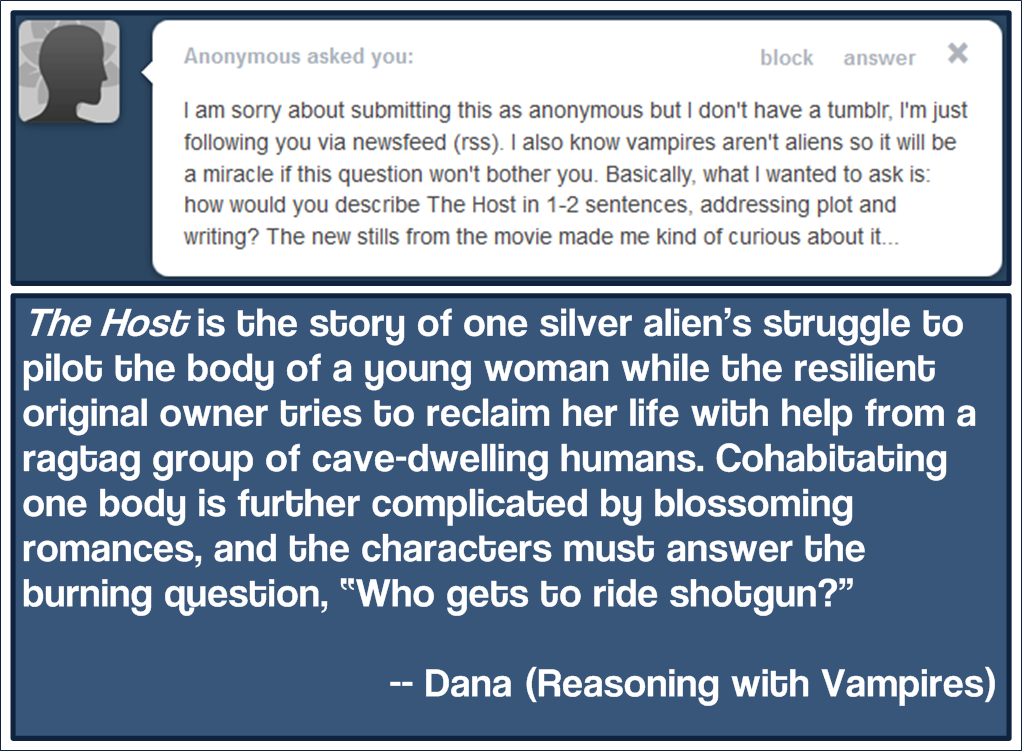The opening paragraph: "The Healer’s name was Fords Deep
Waters. Because he was
a soul, by nature he was all things good: compassionate, patient, honest,
virtuous, and full of love. Anxiety was an unusual emotion for Fords Deep
Water."
Setting and time: a system of caves, somewhere in Arizona desert, USA, in the near future, post-alien
invasion
Key themes: alien invasion, dystopian?, two-souls-one-body,
sentient parasites, non-human forces that wish to do good but do evil instead,
human resistance, underground, monster v. human dilemma, self-sacrificial
heroines that make you scratch your head in utter confusion and say 'wait, what?', kind-of
sci-fi but not really (this is not sci-fi), love rectangle, alien logic
Kalinda’s Review
There are no huge spoilers in this review.
Read on without fear (ok, there are minor spoilers depending on how strict you are about spoilers, but Kalinda does't give away any names just hints at things from afar).
At first
Kalinda didn’t feel particularly interested in reading The Host due to her
prejudice (ok, nobody’s perfect!) but then despite herself, she caved in. She
is kind of happy that she did. For her surrender to The Host she blames her
sisters-in–crime for continuously enticing her to read this Ms Meyer’s
non-Twilight book because ‘it is better
than Twilight’. Since when the Twilight became the book against which we
measure literature, she asked, but then she realized the comparison was indeed fair
when it came to Ms Meyer’s work.
Instead of
summarizing The Host here, Kalinda would like to cite Dana from the Reasoning with Vampires, for it is a
hard task for provide a better recap of this book.
As a
(non-parasitic) alien from outer space herself, Kalinda was expecting a lot of
alien wickedness from The Host. Namely, she was expecting many moral, social
and cultural complexities that are just bound to occur when two worlds collide.
She can’t really say none of that
stuff happened because it did, to some degree. But was it sufficient? Kalinda doesn’t
think so. She wanted more.
The central
premise of The Host is one of the greatest sci-fi ideas of all times: the body snatchers. An alien invasion in
The Host happens in silence and without struggle or (much) blood. By the time humans realize
something’s happening, it is already too late, for they are invaded.
Aliens or ‘Souls’
are these tiny luminous creatures resembling glow-worms or transparent centipedes.
Somehow, they infiltrate human societies, and hijack bodies by surgically inserting
themselves into them. A Soul then takes full control of its human host’s brain,
erases its original personality while retaining their memories. Or something
like that.
As Kalinda
mentioned earlier, the idea of body-invading aliens is not original, and neither
is the one suggesting a human mind can and will rebel from within against its invader (for rebellion against oppressive authority is what being human is all about). However,
Meyer does a good-enough job building on these themes, adding layer after layer
of complexity (though said complexity mostly having to do with unexpected romantic
entanglements). Yes, in case you were wondering there is a love triangle in
this book. Or more it is like a love rectangle (the human host is in love with this
one guy while the host’s invading Soul slowly develops feelings for another…
Very confusing moments and dialogues ensue).
Kalinda found
Meyer’s descriptions of other planets, worlds, civilizations oversimplified; and
the Souls’ virtuous views of things rather underdeveloped. Also, the themes of
self-sacrificing heroines and domineering men that know better than the heroine what
she wants (not at all uncommon things in Meyer’s work), in The Host are simply too
much at times.
If Kalinda had
to pick one thing she liked about this book it would have to be the way Meyer
works in the monster versus human dilemma into the story. From the very beginning of this story you are confused: who is the baddy and who is the hero here? Are aliens truly
evil in their twisted justification for the invasion of Earth (“Life on Earth is
evil! We are actually doing humans a favor by invading them!” (not an actual quote from The Host))? Or is it the
cave-dwelling humans who are wicked monsters for seeing the world strictly in
black-and-white and having trouble recognizing sainthood-bordering goodness
that is right before their eyes?
This continuous
confusion/dilution of good and evil spills over into the narration of the book,
as well. The Soul in question (aka Wanderer, aka Wanda) starts off as the narrator
before passing the baton to Melanie, her resisting human host and then the narration kind of switches between the two. In the beginning, Wanda is the monster and Melanie is clearly
the human, the victim, the one for a
reader to cheer for. However, somewhere towards the middle of the book, the
narration takes on the third dimension by referring to the host/invador duo as ‘we’, not-so-subtly hinting as the two opposing forces locked into one body finally finding a common
ground and starting to like each other (yes, it is as weird as it sounds). By the
end of the book, you may kind of end up feeling for Wanderer’s plight and not particularly
liking Melanie, though Wanderer does go overboard more than once with her
self-sacrificial tendencies, and it is hard to swallow the logic behind her
decisions without a serious eye roll.
And of course,
the ending… Let’s just say, the faux-ending
that Meyer presents to us at first though a depressing one, is the one that really should have
been, the only ending logically acceptable, as well as the ending that Wanderer
actually wished and asked for herself.
The real ending, however is the total
opposite of the faux-ending (duh!) and though sweet, it kind of obliterates the
human v. monster problem all together. Though Kalinda does understand that nobody
wants to pick a Stephenie Meyer’s book and cry their eyes out in the end,
right? Right?
Kalinda’s Verdict: if you are a hardcore sci-fi fan,
this book will be an insult to your sensibilities. Do not read it. However, read
this book if you want an Intro into alien-body-snatchers as The Host will most
likely provoke many questions which is usually a good thing. Also, read this
book if you enjoy reading stories featuring confusing love rectangles, for The
Host definitely prides itself on having a seriously messed-up one. Read this
book, because it is being made into a movie and it is usually a good idea (Kalinda believes) to read the book first and then see a movie, not vice
versa. Kalinda gives this book 3.5 stars out of 5 because this book was better
than she expected, despite its disturbing cover art.


No comments:
Post a Comment